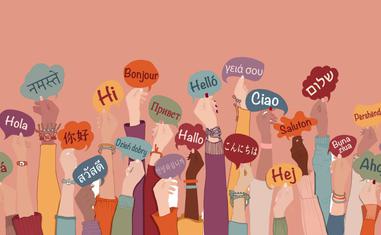The views expressed in our content reflect individual perspectives and do not represent the authoritative views of the Baha'i Faith.
I opened the packing box for an item I had bought for a trip – and found most of the space in the box taken up by 11 separate instruction manuals, each in a different language.
I thought: Wow, so much paper, so much translation, so much energy needed because of so many languages!
Considering that 11 already seemed like too many to include, I wondered how the manufacturer had decided which ones to exclude. How many languages exist in the world? I haven’t been able to find a definitive answer to this question, although most rough estimates say somewhere around 7,000 languages currently exist. Along with estimates ranging in the multi-thousands comes uncertainty about variations, spoken vs. written, dialects, and so forth.
RELATED: Uniting a Sustainable Humanity through a Universal Auxiliary Language
But does it matter how many languages there are? Even if it’s only 11, that is too many, if we don’t have one that everyone knows.
Baha’is recognize the value of languages as a cultural expression, and support maintaining native languages for every culture. Yet the Baha’i teachings envision a future with each person speaking two languages — a native tongue, and a universal auxiliary language.
This universal auxiliary language, the Baha’i teachings say, would serve as a commonly-spoken global means of communication, learned by all people from an early age, and used anywhere and everywhere.
Baha’u’llah, the prophet and founder of the Baha’i Faith, wrote:
It is incumbent upon all nations to appoint some men of understanding and erudition to convene a gathering and through joint consultation choose one language from among the varied existing languages, or create a new one, to be taught to the children in all the schools of the world.
The day is approaching when all the peoples of the world will have adopted one universal language and one common script. When this is achieved, to whatsoever city a man may journey, it shall be as if he were entering his own home.
The Baha’i teachings do not suggest the end of language studies; travel is more immersive, business more advanced, and literature enhanced through knowing other languages. But imagine a world where everyone could speak to everyone else — where we could potentially conduct basic communications without translation. Imagine the effects of a universal auxiliary language on commerce, on friendship, on global peace.
It’s often said that English is the language of commerce, French the language of love, Arabic the language of poets. Although many variations exist on this theme, the idea that some languages are better suited than others for specific uses is a valid point. But acknowledging the distinctions among languages is a separate issue from seeking basic communications through a single common language.
The needs of the world at large include diplomacy, commerce, politics, finance, security, intellectual property, trade agreements, cultural exchange, and so much more. With so many problems facing humanity today — so much division and trouble — Baha’is believe we would be better off if we had a common language.
Many people, not just native English speakers, claim that English is already becoming a universal language. Speaking English, I can travel through most of the world and find people who also know some English. On the other hand, I have also found that travel is more fun if I know even a few phrases of the local language. My vocabulary may be limited and my accent terrible, but people appreciate the fact that I at least tried. I also think it might be fairer if the universal language turns out to be auxiliary, in the sense that it would be an additional language for everyone to learn.
RELATED: What Language Do You Pray In?
Asked about the characteristics of a future universal auxiliary language, Abdu’l-Baha answered in part:
It will be governed by the simplest rules, and there will be no exceptions; neither will there be gender, nor extra and silent letters … the mother tongue will be taught, as well as the revised Universal Language.
While we’re at it, the Baha’i teachings point out that we also need a standardized set of weights and measures, as reflected in this advice from Shoghi Effendi’s book The World Order of Baha’u’llah:
A world script, a world literature, a uniform and universal system of currency, of weights and measures, will simplify and facilitate intercourse and understanding among the nations and races of mankind.
This has been the case for decades, but increasingly the lack of it is troublesome. Last week at the grocery I tried to compare prices for some fruit. One brand was priced by the pound, another by the kilogram, and yet another by the quart — which made comparison both impractical and awkward. I asked a store clerk for help, and she found a scale so that we could weigh the quart. Then I did some calculations to decide what to buy — way too much work for a bunch of grapes.
Some day, when we finally have one language that everyone knows in addition to their own native tongue, we will befriend each other more readily. Whether through travel or other encounters, we will come together more comfortably. Then, beyond our words, we will see other signs of unity. A warm smile, an act of kindness, a helping hand — all can be offered with or without words.

















Comments
Sign in or create an account
Continue with Facebookor